My mother often complained of my father’s teeth grinding at night. Later, my father developed temporomandibular joint (TMJ) syndrome which makes his jaw joint and muscles ache. To help ease the pain caused by his TMJ disorder, we went on a hunt for the best TMJ pillow. We dove deep into this subject matter and decided to create a complete guide. All the information we gathered will help you as well if you suffer from bruxism and jaw clenching.
Best Pillows for TMJ Problems: Quick Comparison
Winner |
EnVy TMJ Relief Pillow for TMJD & Jaw Pain
|
Check Price |
Runner Up |
Therapeutica Orthopedic Sleeping Pillow
|
Check Price |
Best for TMJ Side Sleeper |
Pure Comfort Pillow
|
Check Price |
Budget Option |
Accutrig TMJ Pillow
|
Check Price |
Please note that although the last one is called pillow, it’s actually not intended for sleeping. You should use it for 15 minutes a day to relax and reduce tension.
Many people, myself and my family included, were surprised when our dentist told us that my father’s problem could be solved if he changed his pillow rather than go through extensive and painful medical procedures. Teeth grinding and TMJ can be relieved if you use the correct smart technology pillows that allow you to minimize the pressure on your jaw. They’ll also hold your head and neck in the right position, thus preventing the involuntary movements a.k.a bruxism.
Best TMJ Pillow (Jaw Clenching, Bruxism & Teeth Grinding) 2025
1. EnVy TMJ Relief Pillow for TMJD & Jaw Pain
Best Pillow for TMJ Problems
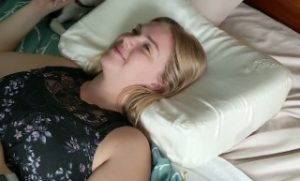 The EnVy TMJ Pillow with its stellar reviews is the best one you can find on the market for TMJD and teeth grinding.
The EnVy TMJ Pillow with its stellar reviews is the best one you can find on the market for TMJD and teeth grinding.
The patented gull-wing design encourages back sleeping, which is ideal but also allows side sleeping without the unwanted pressure on the jaw.
The specialized memory foam and a unique contoured surface shaped like a V ‘OFF loads’ the weight of the head and subtly positions the jaw away from the pillow.
That helps take all the pressure off your face and jawline and make sure you sleep well without feeling pain or the usual type of uncomfortable sensations you have with your regular pillows.
Simply put, the way the EnVy TMJ Pillow is designed will decrease the pressure of your jaw and help you reduce the pain.
Apart from that, if you include it in your treatment plan it will promote the healing of your inflamed area.

Pros
- Innovative design that relieves pressure
- Very easy to clean
- Specially made for people suffering from inflamed joints of the jaw, otherwise known as TMJ
- Relieves migraines
Cons
- A bit expensive
2. Therapeutica Orthopedic Support Pillow
Second Best TMJ Pillow
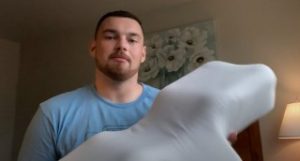 Flexibility is the name of the game when it comes to the Therapeutica Sleeping Pillow.
Flexibility is the name of the game when it comes to the Therapeutica Sleeping Pillow.
Not only do you get to choose from 5 different sizes, but it also has an ergonomic design which ensures maximum support.
It’s great for sleeping on your back, as you should if you suffer from bruxism or TMJ.
Therapeutica cervical pillow for TMJ will make sure your head remains in the correct position all through the night.
Keep in mind that this is not your typical pillow. Made from a firm, hypoallergenic and non-toxic foam, this pillow may take some time to get used to.
It will be all worth it when you start waking up without all the pain and stiffness you get from bruxism and TMJ.
Be sure not to overuse it during the adjustment period.
It’s a sized product, so it’s important to follow their sizing instructions.
Pros
- Made from non-allergenic, non-toxic foam
- 5 different sizes to choose from
- Suitable for all sleeping positions
Cons
- Takes time to get used to
3. Pure Comfort Side Sleeping Pillow Review
Best Pillow for TMJ Side Sleepers
If you are a side sleep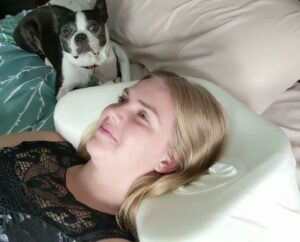 er check out the Pure Comfort Side Sleeping Pillow as it has been specially designed for side sleepers.
er check out the Pure Comfort Side Sleeping Pillow as it has been specially designed for side sleepers.
It will relieve the pressure you feel when you sleep on your side and help you feel less pain and will also reduce your inflammation.
It even features ear cutouts that will prevent ear pressure as you sleep.
Better yet, this pillow reduces overall facial pressure so it’s great for CPAP wearers and people who suffer from bruxism and TMJ.
It comes with inserts, so you can adjust it for optimum support. You can also use it without any worries since it is certified made for CertiPUR-US certified.
This means that it’s free from any toxic chemicals which can affect your health.
If you have allergies, this pillow is a good choice too since it is hypoallergenic and its bamboo cover is resistant to dust mites.
You can even clean this whenever you want since it is machine washable.
Pros
- Adjustable height
- Suitable for CPAP wearers and people with bruxism, TMJ and allergies
- CertiPUR-US certified
- Easy to clean
- Comes with a 100-day money-back guarantee
Cons
- A bit on the small side
4. Accutrig TMJ Relief Pillow Review
Budget Option for TMJ Problems
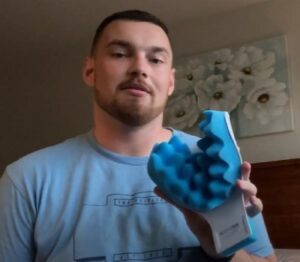 This is the best cheap pillow for TMJ so if you’re on a tight budget, this is the pillow for you.
This is the best cheap pillow for TMJ so if you’re on a tight budget, this is the pillow for you.
It’s amazing if you want a sure relief for your bruxism, TMJ, and jaw clenching but also if you suffer from a herniated or compressed disc, headaches, a bad alignment of the spine, or pinched nerves.
Please note that it’s called a pillow but you are not supposed to sleep on it. You only have to use it for 15 minutes every day to relieve the TMJ symptoms.
Pros
- Designed to help with bruxism and TMJ but also a wide variety of neck and back pains
- Budget-friendly
- 15 minutes every day
- Helps realign your spine
- You can use it while working, watching TV etc
Cons
- A little too small
TMJ and Bruxism Explained
Let’s start off by delving a little deeper into the concepts of ‘bruxism,’ ‘TMJ,’ and ‘teeth grinding.’ When my family and I were introduced to these unfamiliar ideas, we were planted on the threshold a whole new world of ailments and had no idea how harmful they were, what they meant, what caused them, and if they could lead to anything more serious.
What Is Bruxism?
The name ‘bruxism’ was introduced to the world more than one hundred years ago to represent a simple thing. The idea of using one of your body parts in a way it was not intended to be used. In this case, we are talking about your jaw muscles, which move involuntarily or spasmodically.
They can also move rhythmically if the person has more control over them. Bruxism can happen both when you are awake and when you are sleeping. Most people who have sleep bruxism don’t realize they have it until told about it.
What Causes Bruxism?
The causes of bruxism are not known. However, most doctors tend to believe it is either a genetic condition or that it’s caused by external factors such as stress, anxiety, or sleep apnea.
Some studies have even shown that both bruxism and TMJ tend to appear more in people with hyperactive personalities.
On the other hand, psychologists say that bruxism can be a coping mechanism, much like biting your nails, your lips or your cheeks.
Is Bruxism the Same as Teeth Grinding and TMJ?
Yes, bruxism is the same as teeth grinding but it is not the same as TMJ. Simply put, bruxism is merely the act of involuntarily grinding your teeth during the night.

The human jaw and teeth are powerful enough to bite through bones and even wood. That doesn’t happen merely because our brains stop us from doing it. However, during the night, when you suffer from bruxism, you grind your teeth with a greater force than when you are awake.
TMJ, otherwise known as Temporomandibular Joint Disorder is a very serious medical condition that manifests itself through inflammations of the joints.
In other words, if a patient suffers from bruxism, as mentioned above, he or she is not even aware of this because they don’t feel any consequences of grinding their teeth through the night.
However, a patient suffering from TMJ will wake up with headaches and dizziness. They will also feel different degrees of pain in their jaw, depending on how severe the inflammation is.
Apart from that, they complain of hearing popping sounds when trying to yawn or open their mouth wider than usual. They also report that the pain makes it difficult for them to chew their food.
How Can You Tell If You Have TMJ?
There are a few symptoms of TMJ that you can look out for in case you suspect you might be suffering from it.
- Pain in either one or in both your jaw joints.
- Tenderness or actual pain radiating throughout your entire jaw.
- Pain inside or around your ear.
- You feel pain while you chew, speak or yawn.
- Your jaw locks so it’s difficult to move your mouth in a normal way.
So, in case you were wondering how does TMJ affect the body, these are a few of the symptoms you will be feeling, including headaches and throbbing ears.
What Is the Difference Between TMD and TMJ?
The more you delve into this subject the more terms crop up. Plus, they start to be used in an interchangeable way.
So what’s the deal with TMD? What’s the difference between TMD and TMJ.
TMD is a term dentists have to refer to a condition in which your jaw is actually misaligned.
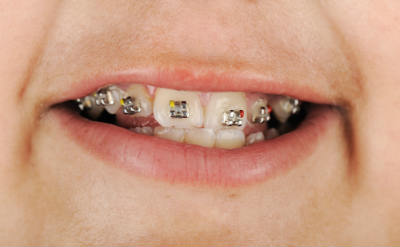
This can happen if you had crooked teeth as a child and never wore braces to correct that or if you suffered some trauma. As a result from TMD, normal tasks such as eating and speaking can turn out to be painful and even affect other areas of your body.
It’s reported that 15% of all Americans have TMD.
Pillow as a Solution for Teeth Grinding and TMJ: Why and How It Works
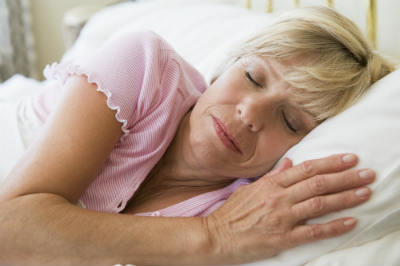
It may seem odd at first that a pillow should be the solution to your teeth grinding problem and even TMJ, but new studies are coming up with conclusive evidence that this is true.
It all has to do with the way you sleep, your body’s position and, of course, the type of pillow you use.
How Do TMJD Pillows and Bruxism Work?
The first thing you need to understand is that both bruxism and TMJ have a lot to do with the way you position your head and body while you sleep.
They’re not caused by this. However, correcting the way you sleep can help alleviate the two syndromes and even correct them until they’re gone.
The best thing to do is to try to sleep on your back. If you sleep on your side or worse, on your stomach, all the tension accumulated in your neck, shoulders, as well as the weight of your head will lay heavy on your jaw.
This will place a lot of stress on it. If you grind your teeth you can produce serious damage to them if they are also under a lot of pressure and weight.
However, evidently, one cannot control the position they sleep in or while they’re unconscious. This is where the best pillows for TMJ and teeth grinders come in.
They are typically contoured pillows that won’t allow you to turn your head while you sleep. They also help you relax your neck muscles, relieving all the strain.
If you do sleep on your side and cannot correct this, use the same type of contoured and specialized pillow but keep your normal pillow hugged between your arms. This will help your whole body relax, eliminating the psychological need to grind your teeth.
Things to Consider when Buying a Pillow for TMJ Relief
Symptoms of bruxism, or teeth grinding, can include chipped or lose teeth, worn tooth enamel, increased tooth sensitivity, tired jaw muscles, and dull headaches. Moreover, severe cases of bruxism can develop into jaw disorders, headaches and damaged teeth.
As such, you’ll want to find the right pillow that decreases your teeth grinding.
Sleeping Position
One of the things you’ll have to consider is your sleeping position. Sleeping on your back reduces the stress on your jawline and there are pillows that can help keep you in this position.
But, if you sleep on your side, this increases your chance of teeth grinding so you’ll want to look for a pillow that can reduce the strain.
Support
You’ll want to look for a pillow that can ease the strain to your jaw. There are also some pillows that will help you sleep on your back since its the best position to prevent teeth grinding. But if you have sleep apnea you should sleep on your side.
FAQ
What’s the best sleeping position for TMJ and to prevent teeth grinding?
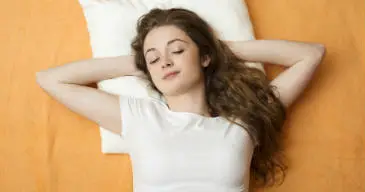
If you have bruxism or TMJ, it’s best to sleep on your back. That puts the least amount of pressure on your face and jaw. DO NOT sleep on your back if you have sleep apnea or are pregnant. Sleep on your side instead.
What’s the worst sleeping position for TMJ?
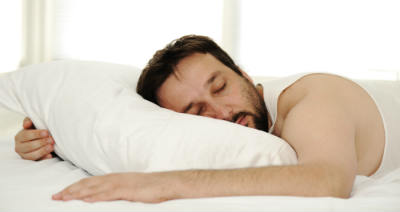
The worst for people with bruxism or TMJ is sleeping on the stomach. This is because it puts your jaw, neck, and spine in an unnatural position.
Apart from that, when you sleep on your front, the entire weight of your head concentrates on your mouth and jaw putting enormous pressure on it.
This makes you grind your teeth even harder and if you were already suffering from this ailment, the damage would be incomparable.
Can sleeping on your stomach cause TMJ?
Doctors and researchers have not been able to pinpoint an exact cause for TMJ. Some relate it to stress and bad sleeping habits, while others say that it’s a way for your subconscious to release pressure when it cannot do so naturally during the day.
Others point to the fact that TMJ might be a genetic disorder. However, while we cannot say for sure that sleeping on your stomach is an exact cause of TMJ, it definitely makes it worse.
Does magnesium help with bruxism?
If you’re looking for a natural relief when it comes to teeth grinding, you might want to take a look at magnesium.
Magnesium is a mineral already found in the human body that acts as a muscle relaxer. However, you may want to supplement your intake if you suffer from bruxism to make sure it relaxes you and stops you from grinding your teeth.
Does TMJ get worse at night?
Yes, it does. It’s because you simply cannot control yourself while you sleep as you do during the daytime.
This means your muscles have free reign to spasm away, causing pain and anguish.
But does TMJD make you sleepy?
Yes, it’s possible, although not all patients experience this. The theory is that the pain is so intense and the spasms are so long and strong that they leave you feeling overwhelmed and exhausted.
What helps tight jaw muscles?
Apart from a good pillow designed specifically for your bruxism and TMJ problems, you can also try massage.
Visit a professional, ask a family member to massage your jaw or do it yourself if you’re feeling strong enough. Start at the temples and ease your way down to your jawline.
This is also the perfect answer in case you were wondering how to relax your jaw before bed.
Prefer listening to reading? Check out our video version of the best TMJ pillows article.
Conclusion
So, what’s the best Pillow for TMJ in 2025?

As we’ve already seen, the best pillow for teeth grinders and patients suffering from TMJ problems is the EnVy Pillow.
It’s a luxurious item that guarantees to relieve your pain and swelling. Honorable second place belongs to the Therapeutica Firm Orthopedic Support Pillow.
If you just can’t sleep on your back and are strictly a side sleeper, go for the best TMJ pillow for side sleepers – PureComfort.
If you’re on a tight budget and looking for a cheaper option to relieve TMJ, go for Accutrig TMJ Relief pillow. Do keep in mind that although it’s called “pillow” you should only use it for 15 minutes and not use it for sleeping.
Sleep well!

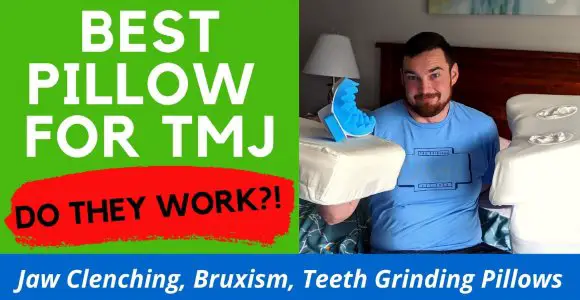


Pingback: Dental Night Guard Side Effects (What You Should Know)
Pingback: Best Sleeping Position to Stop Grinding Teeth
Pingback: Therapeutica Orthopedic Sleeping Pillow Review [With Pictures]
Pingback: Best Mouth Guards for Sleeping 2019: Stop Grinding Your Teeth!
Pingback: TMJ and Sleep Apnea Connection [Can TMJ Cause Sleep Apnea]
Pingback: How Long Does TMJ Last [Does TMJ Pain Go Away On Its Own ]
Pingback: 5 Ways You Can Prevent TMJ Syndrome From Worsening - Nikeairmaxshoes
Pingback: 5 Ways You Can Prevent TMJ Syndrome From Getting Worse - Dysonhairdryer